FRANCIS
O F A S S I S I
THE ESSENTIAL WRITINGS
In His Own Words
FRANCIS
O F A S S I S I
THE ESSENTIAL WRITINGS

In His Own Words
TRANSLATED, INTRODUCED, AND ANNOTATED BY JON M. SWEENEY

2013 First Printing
Francis of Assisi in His Own Words: The Essential Writings
Copyright 2013 by Jon M. Sweeney
ISBN: 978-1-61261-069-6
Unless otherwise noted, all Scripture quotations, are taken from The New Revised Standard Version, copyright 1989 by the Division of Christian Education of the National Council of the Churches of Christ in the United States of America. Used by permission. All rights reserved.
Scripture quotations marked (NAB) are taken from the New American Bible, revised edition 2010, 1991, 1986, 1970 Confraternity of Christian Doctrine, Washington, D.C., and are used by permission of the copyright owner. All Rights Reserved. No part of the New American Bible may be reproduced in any form without permission in writing from the copyright owner.
Library of Congress Cataloging-in-Publication is available.
ISBN 978-1-61261-069-6
10 9 8 7 6 5 4 3 2 1
The Paraclete Press name and logo (dove on cross) is a registered trademark of Paraclete Press, Inc.
All rights reserved. No portion of this book may be reproduced, stored in an electronic retrieval system, or transmitted in any form or by any meanselectronic, mechanical, photocopy, recording, or any otherexcept for brief quotations in printed reviews, without the prior permission of the publisher.
Published by Paraclete Press
Brewster, Massachusetts
www.paracletepress.com
Printed in the United States of America
This book is dedicated to
BROTHER MATTHEW
Happy are those who live in your house,
ever singing your praise.
PSALM 84:4
Thank you for your friendship.
 CONTENTS
CONTENTS 
 INTRODUCTION
INTRODUCTION 
I WILL ALWAYS REMEMBER THE OCCASION IN HIGH school when I first encountered a massive red book about Francis of Assisi in my public library. According to the copyright page it was titled St. Francis of Assisi: Writings and Early Biographies: English Omnibus of the Sources for the Life of St. Francis. A mouthful! But the spinethick as a brickread simply, St. Francis of Assisi Omnibus of Sources. Omnibus. I had to investigate to find out just exactly what that meant.
The volume weighed at least a few pounds, with nearly 2,000 pages. Id never seen a book so large. But having recently read my first biography of St. Francis and immediately fallen in love with the life and charism of such an unusual follower of Christ, I grabbed the Omnibus from the shelf. Opening the front cover, I saw that it was published by Franciscan Herald Presswhat a perfect name for a publisher of such a bookand on reading the foreword, I was enthralled. Everything that anyone would ever want to know about Francis was apparently inside. Even the strawberry red cover, a design detail perfectly suiting the early 1970s when it was first published, appealed. Checking the Omnibus out with my library card, I took it home and read studiously for two weeks the first few hundred pages. I have no memory of whether I actually finished reading the book (I seriously doubt it, in fact), but Im certain that I made a dent, and the enthusiasm for studying the early Franciscan movement was born in me.
Despite the unlikelihood of reading the 2,000-page Omnibus all the way through, it is a challenge to find a copy of that classic work in any of its early editions in which the binding is not seriously cracked. In other words, people really read the book and, in publishing terms, it was a hit. Since that time, there has been no shortage of new books on Francis. Still the worlds most popular saint, the stories of his life inspire more people than one can imagine. Since the Omnibus, there have been numerous other scholarly renditions of the early biographical writings about him, most notably the now essential three-volume Francis of Assisi: Early Documents, published in 19992001.his own writings. Sometimes, in fact, they do not realize that he wrote anything at all.
There are many great biographies of St. Francis and those are usually read instead. I have always been most partial to Paul Sabatiers, which I reedited and published more than a decade ago under the title The Road to Assisi: The Essential Biography of St. Francis (2003). There are several other excellent ones, too. For instance, I recommend Julien Greens beautifully written Gods Fool: The Life and Times of Francis of Assisi, translated from the French (1985), and Francis of Assisi: A Revolutionary Life by Adrian House (2001) is also very good. For a more scholarly treatment, you might turn to the slim, recent, and authoritative Francis of Assisi: A New Biography, by the medieval historian Augustine Thompson, OP (2012), and the highly acclaimed Francis of Assisi: The Life and Afterlife of a Medieval Saint by French scholar Andre Vauchez, recently translated into English (2012). And on the hagiographical side of things, for the most charming collection of tales about the life of St. Francis, you cant do better than Brother Ugolinos The Little Flowers of Saint Francis (various editions).
Despite all of these great lives of the Poverello, I still wish that people would turn to Franciss own words first, or at least more often. Even his first biographersthe thirteenth-century writers Thomas of Celano, St. Bonaventure, and the first editors of The Little Flowersrarely quoted from his writings. So it surprises many people to discover that Francis wrote numerous letters, religious poems and songs (laude), and a few very important treatises and rules for religious life.
Nevertheless, Francis was not a man of many words. He was not a scholarly saint like Augustine or Thomas Aquinas. He was never a famous orator-saint like John Chrysostom. In fact, it is impossible to imagine Francis sitting in a library or with a pen in his hand. Francis wasnt even what you might call intellectually curious, like the saints Ignatius of Loyola and Teresa of Avila, both of whom wrote a great deal, studied and pondered ideas, and, as a result of their writings, left us with many biographical details about their lives. Some have even accused Francis of being anti-intellectual, and for good reasons: he often warned his brothers against owning books and excessive reading. He counseled his brothers again and again to study only if they could do so without it ruining their spiritual lives. And yet he wrote.
For such a personfocused more on the active than the contemplative or intellectual lifeFrancis wrote only when a good occasion called for it. One scholar has recently explained this well:
The Poor Man of Assisi, who was lacking in literary skill, did not behave like an author, nor did he give himself over to it with any confidence. He was writing
This new collection of Franciss writings was created in order to fill a gap. Francis of Assisi in His Own Words
Next page

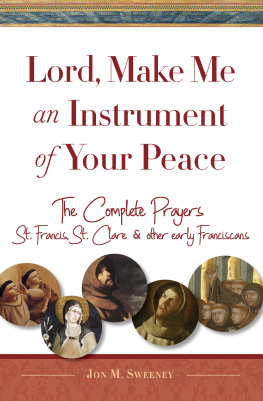
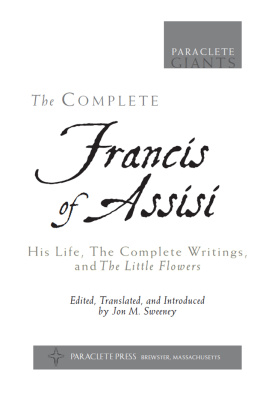
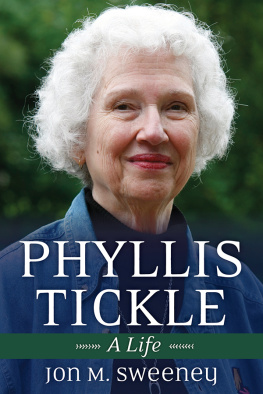




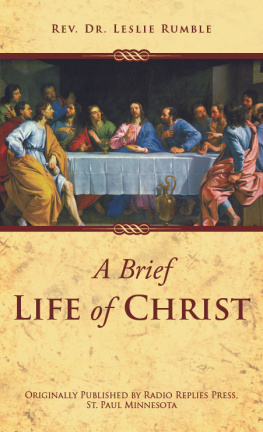
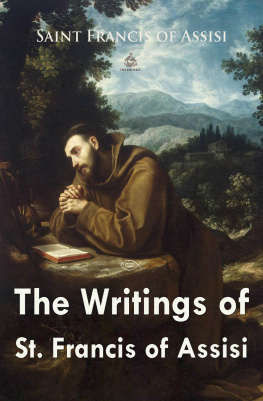
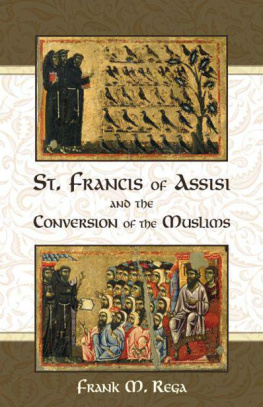
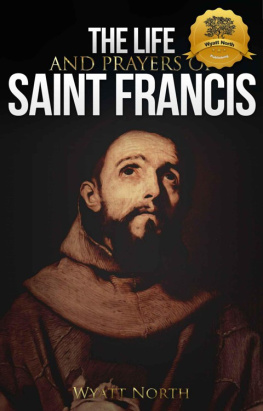


 CONTENTS
CONTENTS 